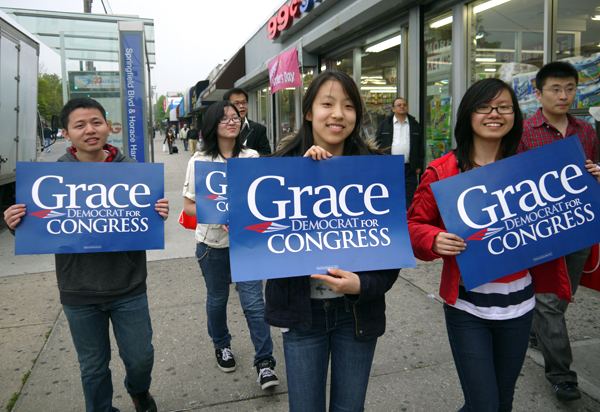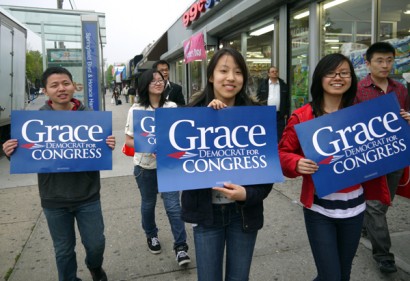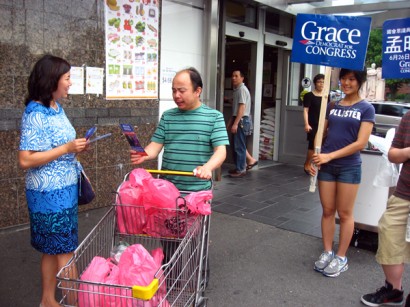It’s been a long day for those hoping to send New York State Assemblywoman Grace Meng from Main Street, Flushing to the mainstream on Capitol Hill.
“After all this work, hopefully she will win!” said Kevin Hong, 18, after a recent door-knocking blitz on his way back to Grace Meng’s campaign office, located in the busy hub of the Asian community in Flushing, Queens.
Political insiders are predicting that the battle to win Tuesday’s Democratic primary in New York’s 6th U.S. Congressional District will be exceptionally close. To many Chinese Americans no less than the Chinese American legacy is at stake.
Arriving home in Queens for his college summer break, Hong said he was shocked to see countless posters for Meng all over Main Street. Since mid-May Hong has been one of 250 volunteers, spending four days a week supporting the candidate who currently represents Flushing in the New York State Assembly.
Hong is majoring in English literature at the University of Buffalo but refuses to attend Chinese Sunday school. When asked if he knows how to write his name in Chinese, he gave a big shy smile and responded, “I really don’t know.” Yet Hong says he feels a cultural connection with Meng, who was also born in Queens. The idea of electing the “first Chinese-American congresswoman from the East Coast,” is what motivated to Hong to help get out the vote for Meng.
“Nice girl,” “daughter of an immigrant,” and “hard-worker” are words often attributed to Grace Meng. Meng herself was a little shy to speak Chinese four years ago when she assumed her seat in the Assembly (a seat once held by her father, Jimmy Meng, the first Asian American elected to the state legislature).
Polling conducted by the Meng campaign and the Global Strategies group shows that Meng has a lead over her four Democratic rivals: City Council member Elizabeth Crowley, Assemblyman Rory Lancman and Robert Mittman, a local physician who has never held public office. She has garnered the prestigious endorsements of The New York Times, El Diario and various political leadersw. However, it’s unlikely that anyone will win by a landslide in such a closely contested race. Lancman is running an aggressive campaign with lots of support from the Jewish community. Crowley has a strong connection with unions and is expected to split a good portion of Lancman’s voter base.
In a newly-drawn congressional district that is almost forty percent Asian, Meng is counting on the Asian American community to propel her to victory. “If Asian-Americans don’t come out on Election Day, everything changes, the polls become meaningless,” a source close to Meng said.
There’s no question Flushing will be critical for Meng in the June 26 primary. The candidate is counting on the same Democrats–—many of them Asian American—who sent her to the state legislature in 2008 and again in 2010. Approximately 30,000 registered Democrats live in Flushing accounting for about 17 percent of the district’s Democratic primary voting population.
Despite its large Asian population, Meng is not taking Flushing for granted. During the last phase of her ‘Get Out The Vote’ effort, the campaign team mobilized most of its volunteers to her Flushing office and focused on reaching out to Asian voters.
Political insiders know a little secret: Flushing is a relatively low-turnout area. While most Queens’ districts saw roughly 20,000 votes cast during the 2010 gubernatorial election, Flushing recorded only 12,547 people at the polls. That’s only about half of the number of people who voted in nearby Forest Hills and Rego Park, which have a large Jewish population.
As a result of the 2012 redistricting process, the 6th Congressional District is now 38 percent Asian, the highest percentage ever. But the number of Asian American registered voters in the district is significantly lower, hovering around 20 percent.
Tarry Hum, associate professor of Urban Studies at Queens College, suggests that the low voter registration rate among Asians in Flushing is due to its large immigrant population. Still, Hum asserts, political education and mobilization can send Asian Americans to the polls in unprecedented numbers with tangible results. This was demonstrated in the 2009 city elections, in which New York City Comptroller John Liu became the first Asian-American to hold city-wide office.
“Asians were very motivated voters in 2009 and their votes certainly made a difference. I think given the demographic trends in political districts with sizable and majority Asian populations, they have the potential to influence outcomes, and this was certainly recognized in the 2009 elections,” said Hum.
Several pollsters worry the June primary will result in single-digit turnout, but James Hong, the Civic Participation Coordinator at the MinKwon Center for Community Action, a Korean immigrant advocacy group, expects a high turnout in the Asian American community, and believes it could make a significant difference in the outcome. According to him, the Chinese and Korean American communities are very interested in the 6th Congressional District race, and “it is pretty clear and reflected in the fundraising as well.”
MinKwon, the only local non-partisan group focused on canvassing Asian American voters in Flushing, made over 1000 phone calls during a phone banking session before the primary. “We are hoping to build up our community maturity, in terms of politics,” Hong said. The advocate believes that newly drawn districts in New York provide Asian Americans an opportunity to increase their voice, but any new immigrant community needs time to catch up with mainstream society.
Kevin Hong’s door-knocking teammate, Edward Wu, 19, admits that the pride of potentially electing the first Chinese American U.S. Congress member from New York moved him to support Meng as well. As the second generation son of a Chinese immigrant family, Wu was sent back to China as a baby and returned to New York in third grade. He volunteered at Meng’s assembly office in 2009 and believes she is going to be a game changer in Congress, bringing mainstream attention and federal money to the area.
Both Hong and Wu will be first-time voters in the 2012 election. After the intense experience of volunteering for Meng’s campaign, Wu, currently a student at SUNY Binghamton, says he is considering a political career. Why? “To make a difference,” he says.
Fi2W is supported by the New York Community Trust and the John S. and James L. Knight Foundation with additional support from the Ralph E. Odgen Foundation and the Sirus Fund.






